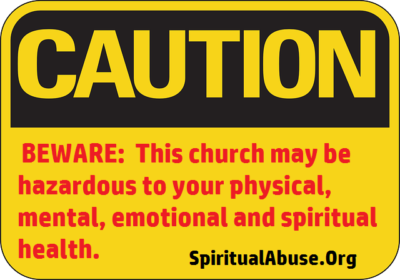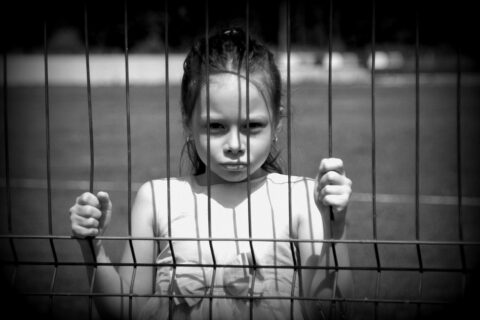Below is the experience of Melanie and Mark who were long-term members of the United Pentecostal Church. They pastored a church for years and Mark held several district positions during his time as a UPC minister. What happened to them isn’t just a one-time incident in the organization, as you will see from a second couple who recently shared a small part of their story. I saw Melanie’s story elsewhere and asked permission to share it here so that others would be able to see it and be helped and encouraged. (Some changes have been made.) The organization doesn’t just bite and devour some of its former members who were never licensed or didn’t hold positions, but they have also done so to their licensed ministers, people who have served the UPCI for years, some for decades.
**********
Mark was born and raised in the United Pentecostal Church. He is now 54. I left Catholicism and came in at 15 (37 years ago). After biting our (ever bleeding) tongues over hearing and seeing more than any one should hear or see as a Christian, much less as a minister in this organization … and further, after raising our children in this, we finally had enough and left about a year and a half ago. The only regret we have is that we didn’t have the courage to do it sooner.
We pastored for over 30 years in various capacities. Mark held many district positions. His most recent pastorate was for 18 years. When I stop here to say that Mark’s identity and livelihood was tied to the UPC, it is an understatement. His family goes back 4 generations. His great grandfather, grandfather, father, brothers, uncles and some cousins are all ministers. His family is well known and respected in the UPC. Most every member of his family, immediate and extended, are “in church”. As far as Mark’s livelihood goes, Mark worked at a building supply store, besides pastoring full time. Two thirds of our income was derived from the church. We depended on the church for our bread and butter. Mark had always felt it was important to earn his own paycheck from outside the church. We both felt it was important to interact with our small town community. However, to survive without the church income was somewhat impossible, or so we thought.
Now, my upbringing, on the other hand, was quite in contrast to Mark’s. My dad owned a bar and therefore, I was raised on the bar stool … the bartender’s daughter. Very well loved by him and quite protected by his bouncers and bartenders. However, I so desperately wanted to know and understand God, that I was willing to do what I needed to do, so as to “prove” it to Him. In reality, it really ended up that I was proving it to those who were telling me what to do. I truly came into this innocently but with a deep desire to learn about and love God. It wasn’t even a year after we were married when I began to see and question things that didn’t add up. But I buried those questions in an effort not to alarm Mark. Not knowing he had the same questions and concerns. During our 33+ years of marriage, we have seen and experienced more junk in the UPC than I care to mention! But as you also know, we were all taught to bury those concerns or questions and to trust in those who have rule over us, to carry on blindly, to focus on “God and His word,” or what they said was God’s word.
We have 3 children, 19, 21 and 29 years of age. We denied our children (and ourselves) so much life and fun in the attempt to do the “right thing”. I am deeply grieved when I think on it. Thankfully, our three children still love and serve God. They are strong in their faith in Him. They also love and are very loyal to family. We were always very open with them, encouraged discussion and also taught them to question and think for themselves. As a result of our deep discussions, our children each formulated their own beliefs and guidelines which, of course (no surprise), were very different than UPC and in some ways different than ours. We are ok with that. We want them to make their own decisions, just as we wanted to make our own. All 3 of our children and son-in-law chose to stay and help our efforts until we left. They all basically said the same thing but at separate times, when they each came to us on their own. They said since we all felt the same concerning the standards, or should I say legalism, they wanted to help us see this thing through and if we couldn’t see it through together, then they wanted us to all leave together rather than fragment off at separate times. We are so thankful for their moral support! Our children have made us feel so honored and loved. They are such blessings to us!!!
Over the years, we had always tried to do our best and comply with the all the rules in an effort to be pleasing to both God and man, with emphasis on “man”. We hoped we could make a difference in helping the 35+ congregation to see another way, to understand what God’s grace was really all about and to allow them to make their own choices without any interference from us. Sometimes we thought we were making progress. How wrong we were, and on so many counts! In spite of constant looks of judgement and gossip, we truly did love them and so continued at our post. It was a heavy load. We were depressed, bound and always stressed. All of us! I won’t go into the fact that our family had to do nearly everything in the church. That’s another long heart wrenching story.
We finally left after our church board was insisting that I quit my new job as an EMT. I had gone back to school, became an EMT and had been working on the ambulance corp for a year and a half before they found out I was wearing a uniform! …. more specifically pants and only while on duty. A double standard, we know. But, we knew that there might be some of the congregation that might accept my wearing them on the job only and then as a result, we might have an open door in the future to discuss the falseness in their long held beliefs. I know it was probably a futile effort, but we loved the people and so much wanted to open their eyes to God’s understanding, grace and freedom.
Let me point out here, that during Mark’s ministry, he never once preached standards. Mainly because he couldn’t bring himself to preach things he questioned. He always allowed people to make their own choices. However, when it was time for us to experience that same liberty, we were denied it … and with extreme anger judgement, I might add! The church turned on us, so ardently, that many fabricated rumors circulating concern our marriage and children! The shunning was so pronounced, it was as though all the good things and sacrifices we made over 18 years as pastor at this church, were negated from this one act! Of course I was to blame for leading my family astray. The woman is always at fault … Of course they say that because they can “see” the “sinfulness”. Mark was reduced to a non-thinking man that could only follow his wife! And our adult children and son-in-law, well it wasn’t their fault, they had no choice but to follow when the mother fails. When in fact, it was all of us choosing to think for ourselves and make our own decisions!
Anyway, there were so many major controlling and insulting issues over the years (too many to count) that should have made us walk away many years ago, but this was the final straw. I was only wanting to help by ministering to the practical needs of my neighbors and surrounding communities. I guess only “sinner” EMT women can minister in this way. None of the church folks would refuse help from a “sinner” EMT woman if she showed up. Anyway, I could rant on and on over the “should haves and could haves” but the simple fact is, we finally did it. We resigned and all left the same night. It was the best decision we ever made. It’s sad to say, but no one from the district has tried to contact us to see how we are. Mark even tried to ask to meet with some of the district board to discuss his concerns and differences before he made the decision to leave…. no bites. It’s painful and hurts deeply to realize their acceptance or approval of us was predicated upon our compliance. In spite of Mark’s good standing throughout all his life in the UPC, no one thought him important enough to check on on him and his family, or even throw him a lifeline. The hateful way we were treated over the couple months before we chose to resign, is more than I can write here. The shunning by the ladies alone was heart wrenching and painful. I became an outcast. No one would speak to me at service, for the most part I was ignored. There is so much more I could add, but I’ll stop now.
I still sometimes have to vent as things surface, but to dwell on them and continue to be angry about them is not something I want to subject myself to. To do so (to me) would make me feel and appear to God as though I am unthankful for His deliverance from this bondage of legalism. Besides, it really only hurts me and not those that have hurt me. The hardships, the lies, the loss of our good UPC standing, the loss of a lifetime network of friends and family, the pain of rejection, the public shaming that I have experienced (verbally in very public places) and the shunning cannot be compared to the the grace, the freedom, the happiness and the joy we now experience in God! Our good financial name has not suffered in the least. God provided ways for us to earn a living that we had not foreseen and would not have foreseen, had we not taken that leap of faith. My income as an EMT doubled since last year and Mark received an increase as well as the opportunity to work overtime every week. We don’t have much but we have enough to pay the bills and we are much happier and at peace. God has provided what we needed. We will never again allow ourselves to be dependent on any church for any amount of income. We are much happier not feeling obliged to the church in any way and earning our own way.
Our family is so much closer and so much happier than we have ever been. No more tension and scrutiny in our home. No more attempting to make sure we are complying to what others think. No more dread of and/or arguing on Sunday mornings and evenings. We look forward to Sunday mornings and going to a free thinking church. We all made our own decisions as to where we wanted to attend after taking a break. And to our surprise, we all ended up at the same church (a community minded Church of God, that does not subscribe to organized religion) and we still gather for Sunday dinner at our house every week. And no evening service! We have time for rest and family. Imagine that! Wow, what freedom! … What peace! What joy! It brings Mark and I so much joy to watch our children and their families live life freely. We have acquired a daughter-in-law and a grandson since we left. What a comfort to know our grandchildren will not be tainted by the UPC’s destructiveness and control.
We are free to love God and love our neighbors as we read it and see it in His word. We no longer serve other men’s convictions. We are free to apply the Scriptures to our lives and work out our own salvation as His word states we are to do. We are FREE at last! Best decision EVER! We are so happy, I smile and have tears of joy when thinking about it …. which is often, indeed. We are truly happy at last. BEST decision EVER!
**********
Note from Lois: Some may be interested in also watching two videos with Esther and Brian Henry, former United Pentecostal Church missionaries to Papua New Guinea. They were also pastors at a UPCI church in Wisconsin. The Wisconsin District of the UPCI and the District Superintendent at that time treated them very poorly. We also have a five part series about people where various people share about being harmed in the United Pentecostal Church.
********
Shop at our Amazon store! As an Amazon Influencer, this website earns from qualifying purchases.





